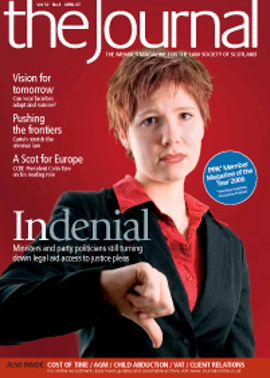Think before you charge

There is no question that solicitors’ services are, in the main, in VAT terms straightforward and liable at the standard rate. The effect of this is that VAT suffered on the cost of providing such services (input tax) is fully recoverable from HM Revenue and Customs (HMRC).
Despite this, there are a number of VAT complications that are pertinent to solicitors’ firms.
Recharges and disbursements
The distinction between recharges and disbursements is important from a VAT point of view as the two transactions are treated differently.
Recharges
Very often, additional costs will be incurred by a firm in delivering its service to the client, such as travel, subsistence and postage expenses. These are supplies that have been made to the particular firm by the third party provider and not supplies made by the third party provider to the firm’s client. However the firm has incurred these costs in order better to provide its service to the client (just as it has incurred other overhead costs), and usually the firm will have contracted with the client to recharge such items as part of the billing process. As these costs form part of the value of the supply to the client, VAT is calculated on the total of the cost of the service including the recharged costs.
This is the case, irrespective of the VAT treatment of the original supply to the firm. Thus if zero-rated air travel has been purchased by the firm in order to send staff to a client meeting, the amount is included as a recharged expense in the client’s fee and VAT added to the total service. The VAT treatment of the original supply is irrelevant. The firm is not making a zero-rated supply of air travel to its client; it is simply recharging its costs of delivering its standard rated service.
The firm is able to recover any input tax charged on the original supply to the firm (on a hotel bill perhaps) of the recharged goods or services, as they were incurred for the purposes of making a taxable supply of services.
Disbursements
Disbursements are made when a firm incurs a cost on behalf of a client where the supply in question is contractually made by the third party to the client but the firm settles the bill and then is reimbursed by the client. Effectively the firm has acted as the client’s agent in settling the liability.
In order to treat a transaction as a disbursement for VAT purposes, the following conditions must be satisfied:
If all of these conditions are met, the disbursement may be treated in one of two ways.
Where no VAT has been charged on the original supply and the client is unable to recover VAT on the firm’s fee, the most advantageous treatment for the client is as follows:
The amount is charged to the client by the firm in exactly the same amount as that suffered by the firm in settling the original bill, and is outside the scope of VAT.
Thus an invoice with both recharges and a disbursement treated in this way would look like the illustration below.
Alternatively, as long as the disbursement conditions are met, goods or services can be treated as supplied to, and supplied by, the firm. However the firm can only recover any VAT on the disbursed amount if the invoice is in the firm’s own name. VAT will be charged on the onward supply if appropriate.
HMRC allow concessionary treatment with respect to counsel’s fees. The firm may treat counsel’s advice as supplied directly to the client (irrespective of the contractual relationship between firm and counsel) and thus settlement is treated as a disbursement. Counsel’s invoice may be amended to show the client as the recipient of the supply, and the client may then be able to recover any VAT charged by counsel.
Partial exemption
The vast majority of supplies made by firms of solicitors will be taxable at the standard rate. However some firms may make exempt supplies (the effect of which is that attributable input tax is irrecoverable, subject to the annual de minimis limits discussed below), such as:
It is beyond the scope of this article to detail when such exempt transactions arise. However where a firm makes such supplies, it will be partially exempt and will need to establish a method for calculating how much input tax may be recovered. If such supplies are made, it is likely that the relative value of these to the value of taxable supplies will be very low, in which case the de minimis limits will come into play. The effect of these is that if the amount of input tax attributable to exempt supplies is sufficiently low, all of the input tax for the period may be recovered (irrespective of exempt supplies being made).
The current de minimis limits are:Where in any VAT period, the exempt input tax (being input tax suffered in making exempt supplies, which usually includes part of the VAT on office overheads) is less than
Overseas issues
The VAT treatment of supplies of services made either to clients overseas or to UK clients with respect to overseas property, depends on the place of supply of the service and differs depending on the circumstances of the client and the nature of the supply.
Services relating to land
These services are deemed to be supplied where the land in question is situated. Thus the conveyancing of a property in Scotland on behalf of a US client is deemed to be supplied in the UK, and therefore VAT is charged to the US client on this supply. In certain restricted circumstances, the US client will be able to recover this VAT.
However the provision of services to a UK client with respect to property in Dublin is deemed to be made in Dublin and is outside the scope of UK VAT. In these circumstances it is necessary to obtain advice as to whether the making of such supplies will necessitate VAT registration in Ireland.
Other consultancy services
The place of supply of other legal consultancy services is determined by the status of the client.
If the client belongs outside the EU, or belongs in another EU member state and receives the services for the purposes of their business, the place of supply is where the client belongs and is outside the scope of UK VAT.
If the client belongs in another EU member state and receives the supply in a non-business capacity, or if the client belongs in the UK, or if it is not possible to determine where the client belongs, the supply is deemed to take place in the UK and VAT is charged accordingly.
Where such services are supplied to the UK firm from an overseas lawyer, no overseas VAT should be charged but the UK firm must account for UK VAT under the reverse charge mechanism (effectively by accounting for output tax on the value of the supply received and usually recovering the same amount as input tax in the same VAT return, assuming that the purpose of receiving the supply was in respect of the firm’s own taxable activity).
Conclusion
Despite the vast majority of solicitors’ fees being straightforward supplies, taxable at the standard rate, there are still particular transactions that are specific to the profession that can trip up the unwary.
Mary F Hallam CA CTA
The author can be contacted to discuss VATpoints raised in this article or otherwise. t: 0131 337 4736 e: mm.hallam@virgin.net
In this issue
- The bigger picture
- Citizen justice
- Purely rhetoric?
- Purely rhetoric? (1)
- Profit, team by team
- Bring them home
- Bring them home (1)
- Local roots
- Wanted! (for conspiracy)
- One voice
- AGM report
- Dealing positively with client concerns
- Block fees: the story behind the changes
- Think before you charge
- For the high jump
- Jury questions
- Put to the test
- Yet another expense
- Planning with people
- Lifting the lid
- Website reviews
- Book reviews
- Home is where the heart is
- PSG - new certificate of title
- SEPA: apply online and save
- SEPA: apply online and save (1)






